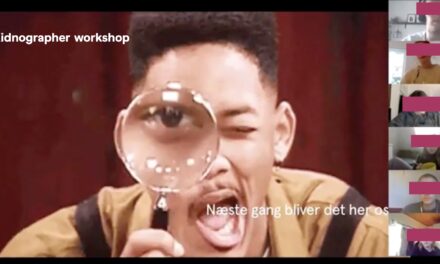Like many other contributors, I caught the TV Dictionary bug during the pandemic (bad pun intended). Making a short video and following a single idea without the pressures and efforts that go into a “traditional” video essay publication (if there is such a thing) and without the requirements of conventional scholarly-theoretical framing, appealed to me and brought a very welcome sense of play into my work routine. In many ways, this format has prompted me to make videos from the perspective of a fan, at least as much as (if not more than) as a scholar. I’ve exclusively made videos about shows that I like and that I’ve binged: Fleabag (possibly my favorite show of the past decade); Friends (definitely the show I have re-watched most often in my life, a show with which I learned English, and an initial source of bonding with multiple close friends in college); Stranger Things season 4 (my companion when I was in bed with Covid); and, most recently, Yellowjackets (a diabolically delicious show that speaks to me for many reasons, including the fact that it centers on women who, like me, like to play soccer). While I didn’t hide my fandom for or delight in the shows I focused on, I also used the exercise to think through my viewing patterns critically. Why do I binge certain shows more than others? What does binging do to me, my mood, my sense of self, and my role as a scholar/critic? Therefore, all four videos are, in one way or another, about and the product of escapism: binging/watching TV as a form of escapism, making TV Dictionary videos as a form of escapism (including procrastinating on pressing tasks by making these videos), and the escapist structures and narratives I sensed in the material I was working with.
My entry on Fleabag centers on the word “jogging”/”to jog.” It starts as a joke on one of the many hilarious vignettes with which Waller-Bridge opens many of the episodes in season one, yet develops into a more serious take on the protagonist’s inner turmoil. Fleabag is, in essence, a show about restlessness: restlessness evoked by grief, guilt, longing, and societal expectations (especially of women of her age–as of my own). Our (anti-)heroine constantly seems to either run away from or run back to and confront something or someone (above all herself). This tension is at the core of her charm and the show’s humor. It makes her relatable, at times despicable, at times enviable. “Jogging”/running away also seemed appropriate for Fleabag because it is such a meticulously and perfectly timed show: the first episode of season two especially, to me, is a perfect episode of television because it hits every rhythmic beat just right.
Escapism features in my video on Friends less with regards to its narrative (although you could certainly pop-psycho-analyze the six protagonists as escaping into their closed-off bubble and hiding from the rest of the world). Rather, it is about the escapism, claustrophobia, and both the “stuckness” and restlessness associated with binge-watching and with re-watching the same show over and over again. I consider this video my most daring and interesting, as well as my most messy, flawed, and over-the-top contribution. I chose the word “enter” and created a jumpy collage out of numerous moments from the show’s ten seasons in which one of the main characters enters our primary living room (in Monica’s apartment). To some extent, I tried to emulate the editing style of Austrian experimental filmmaker Martin Arnold, who turned brief clips from both unknown and well-known Classical Hollywood films into monstrous, repetitive, robotic loops, such as in Pièce Touchée (1989) and Passage à l’acte (1993). In a similar gesture, I wanted to allude to the living room setting, a staple of the sitcom genre, as a space that evokes the genre’s and the show’s familiarity and escapist appeal: we know this apartment, we know these characters, we enter and come back to them again and again just like the characters keep entering the same room because it’s a cozy, welcoming world. At the same time, however, it’s this familiarity, its addictive quality, its invitation to come in, rather than go out into our own worlds, that (like Arnold’s deformations), can turn the same space and the same characters into monstrous entities as well – especially when shows like Friends are widely available on major streaming sites.
Stranger Things and Yellowjackets both present more or less explicit escapist narratives: one is an apocalyptic Cold-War-inspired story, in which characters have to escape a parallel world (the “Upside Down”), the other a survival story about a group of girls who are stranded in the Canadian wilderness after a flight crash and try to escape. Both shows are about teenagers and involve a strong sense of (quintessentially escapist) nostalgia for a past decade – the 1980s in and 1990s, respectively. Yet, both shows also delve into the deeper, darker aspects of trauma, teenage insecurities, and the fight, flight, or freeze coping mechanisms with which its characters respond to them.
I picked the word “monster” for Stranger Things because the fourth season (on which I’m focusing here) particularly hones in on the experience of bullying. In this season, more so than the others, the real “monster” seems to be the emotional pain that humans cause each other.
“Pass” seemed like a suitable word for Yellowjackets because of its prevalent use in soccer and because it suggests a willingness and necessity to literally and figuratively “play along” and get along. The teenage girls and their adult selves in the show are dependent on each other in their survival – just like they were when they played soccer together. Yet the show delves deeply into the power struggles within and behind almost any (enforced) “team” and group formation.
Ironically, while escapism, claustrophobia, and isolation are at the core of what I’ve addressed above and in my videos, it is the social aspect of the TV Dictionary project that has made it so special for me. It is a means, a platform, a community in/through which we connect with each other, with each others’ viewing habits, fandom, and criticism. Because of TV’s medium-specific flow, seriality, as well as its special momentum during the early days of the pandemic when – more so than in the years before or since – many of us seemed to watch the same content at the same time, TV Dictionary has allowed me to see my friends’ and colleagues’ personal takes on shows that I may have seen and enjoyed myself – just like I have been able to present my own back to them. It therefore presents another way to enter (rather than escape) each others’ inner worlds.
A hidden gem from Myrna Moretti:
Evelyn Kreutzer is a postdoctoral researcher at the Film University Babelsberg Konrad Wolf and Associate Editor for [in]Transition: Journal of Videographic Film and Moving Image Studies. She is the co-editor of the Videography blog at Zeitschrift für Medienwissenschaften (ZfM, with Kathleen Loock, Maike Reinerth, and Anna-Sophie Philippi) and the Once Upon a Screen collection (with Ariel Avissar), published in The Cine-Files (issue 15, fall 2020) and [in]Transition (issues 9.3. and 9.4. 2022). Her written and videographic work has been published in journals like NECSUS, Music, Sound, and the Moving Image, [in]Transition, and The Cine-Files. At the Film University, she is leading the project ‘The Digital Video Essay’ (2022–2024), funded by the German Research Foundation (DFG). You can reach her at media.kreutzer@gmail.com.





